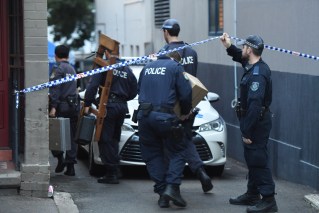Beirut blast raises fears about NSW’s much larger ammonium nitrate stockpile
The deadly Beirut blast that killed more than 100 people has driven fresh calls for a large ammonium nitrate stockpile and plant in Newcastle, storing up to four times the amount reportedly detonated in the blast, to be relocated away from residents.
Lebanon’s Interior Minister said 2750 tonnes of ammonium nitrate was in the Beirut blast.
Newcastle’s stockpile of 6000-12,000 tonnes is stored at Orica’s Kooragang Island plant in the Port of Newcastle, according to the company.
“That factory is only three kilometres from Newcastle’s CBD and only 800 metres from North Stockton residents,” said chemical engineer and community campaigner Keith Craig.
“It’s a totally inappropriate place to have such a dangerous material produced and stored, and it’s something we’ve been complaining about for many, many years.
“Many people would be killed and injured if we had an accident at Orica.”
Mr Craig said he understood the risk in Australia was much lower, but the catastrophic consequences of any accident were too great.
He is one of 300 residents that form the Stockton Community Action Group, which has long called for the Orica plant to be relocated, or its stockpiles of ammonium nitrate to be significantly reduced.
Community groups in other neighbouring suburbs such as Mayfield and Tighes Hill have also strongly expressed their concern about the plant’s proximity for many years following several major ammonium nitrate explosions around the world.
In 2001 an explosion at a French fertiliser factory in Tulouse killed 29 people, and in 2013 an explosion at a fertiliser company in West, Texas, in the US killed 15 people.
Around 300 tonnes of ammonium nitrate was stored at both facilities.

Orica’s Kooragang Island ammonium nitrate plant is within 800 metres of houses. Photo: ABC
Stringent safety regulations
In a statement, Orica said thousands of tonnes of ammonium nitrate was stored at the site on any given day, but stringent practices were in place to ensure its safe storage and handling.
“Ammonium nitrate storage areas are fire resistant and built exclusively from non-flammable materials,” the statement said.
“There are no flammable sources within designated exclusion zones around these areas.”
The company said operations on Kooragang Island were highly regulated under numerous state and federal standards, and the facility held a Major Hazard Facility licence.
“In order for this licence to be obtained, the site’s safety management systems, security arrangements, and emergency response procedures undergo a strict auditing and verification process by SafeWork NSW,” it said.
“We regularly undertake site-wide emergency response exercises, including an annual exercise with the local emergency services.
“It’s important to note that there has not been a single incident involving the storage of ammonium nitrate in the Kooragang Island site’s 51-year history.”

In September 2013, Orica workers discovered a leaking pipe containing about 100 kilograms of liquid ammonia. Photo: ABC
Risk cannot be discounted
Professor of engineering and explosion expert Priyan Mendis from the University of Melbourne said the risk of explosion in an Australian facility was low, but cannot be discounted.
“I can understand the concerns of the residents in Newcastle. Of course there is a risk,” he said.
“The ammonium nitrate has to be triggered, something like a fire has to happen.
“But given the scale of the event in Lebanon, I think Orica needs to review things and reassess what would happen here.
Orica is licensed to produce up to 385,000 tonnes of ammonium nitrate a year, of which the bulk is used to produce explosives for the Hunter’s coal mining industry.
The Kooragang Island plant has a controversial history in Newcastle, after a leak of carcinogenic chemical hexavalent chromium in the air over Stockton in 2011.
It has also been identified as the source of elevated levels of pollution and dangerous PM2.5 particles in Stockton, an issue the company has said it is working to address.
The NSW Environment Protection Authority said it regularly inspected Orica’s facility to ensure compliance with licence conditions.
“Recent inspections have not identified any significant concerns with respect to chemical storage at ammonium nitrate storage facilities,” it said in a statement.








